Unit 6 Nature in words Using language课件(共47张,内嵌音频) 2024-2025学年高二英语外研版(2019)选择性必修3
文档属性
| 名称 | Unit 6 Nature in words Using language课件(共47张,内嵌音频) 2024-2025学年高二英语外研版(2019)选择性必修3 |
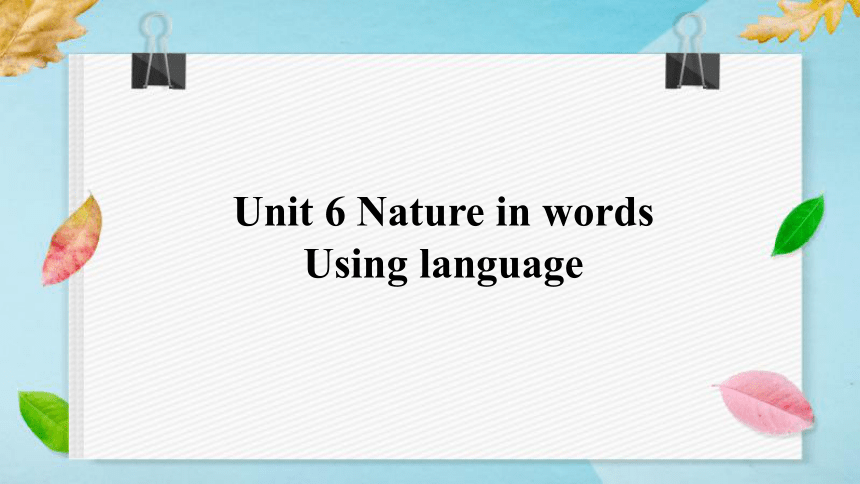
|
|
| 格式 | pptx | ||
| 文件大小 | 10.5MB | ||
| 资源类型 | 教案 | ||
| 版本资源 | 外研版(2019) | ||
| 科目 | 英语 | ||
| 更新时间 | 2025-04-25 00:00:00 | ||
图片预览

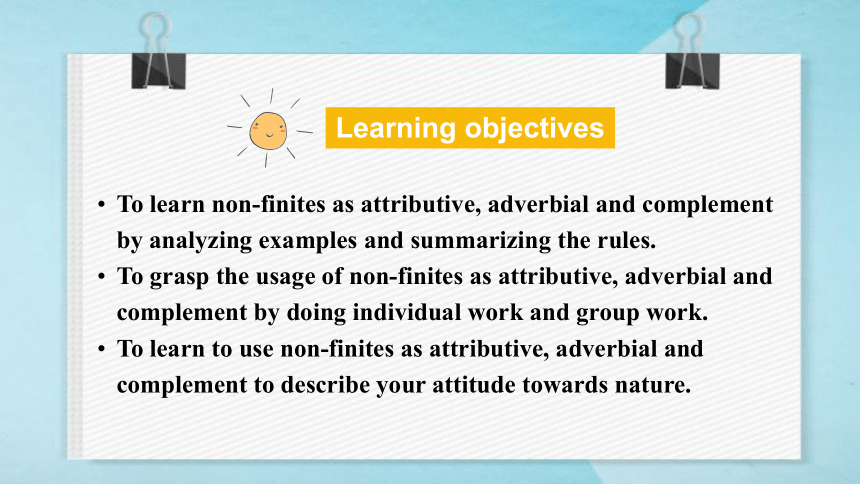
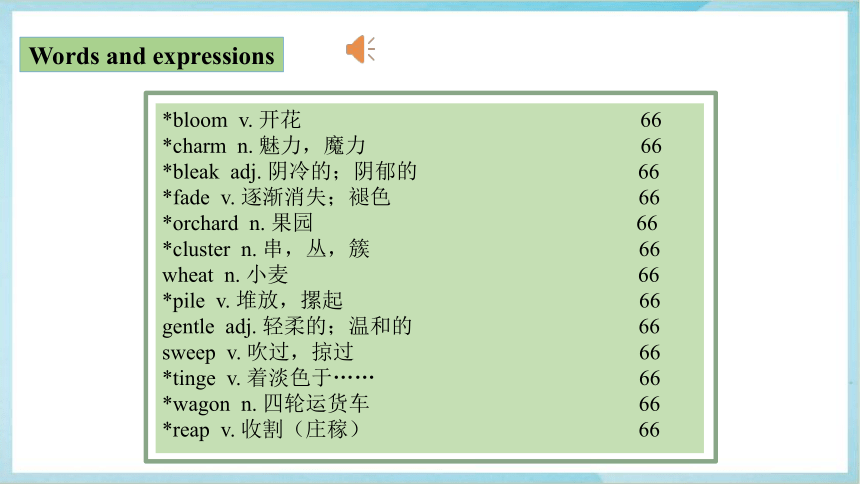
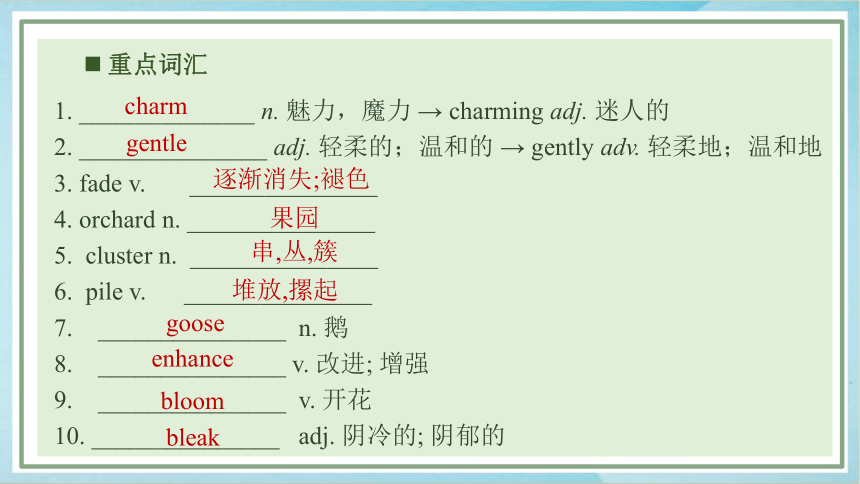
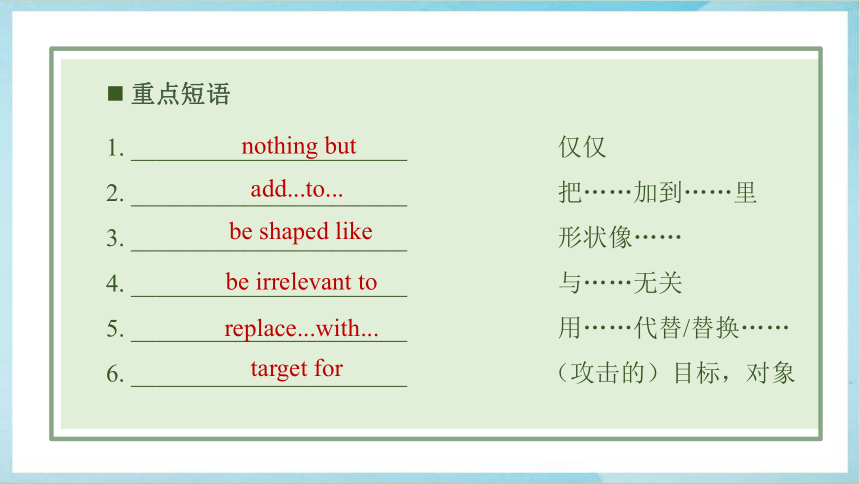
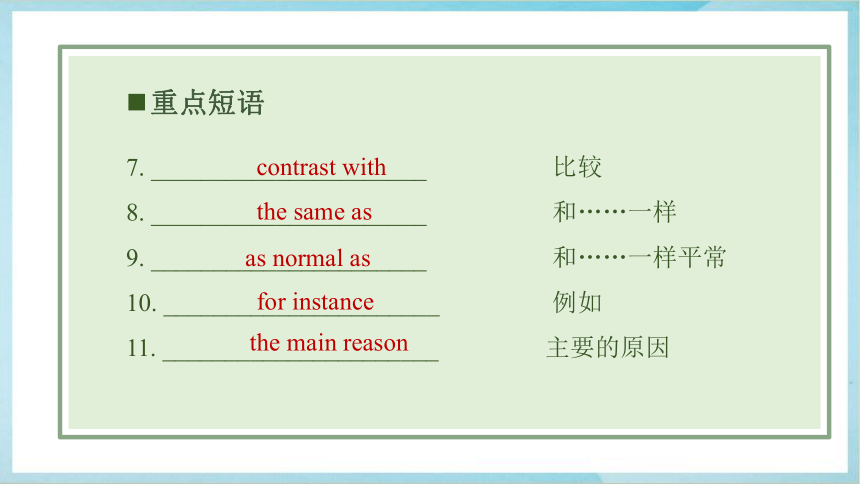
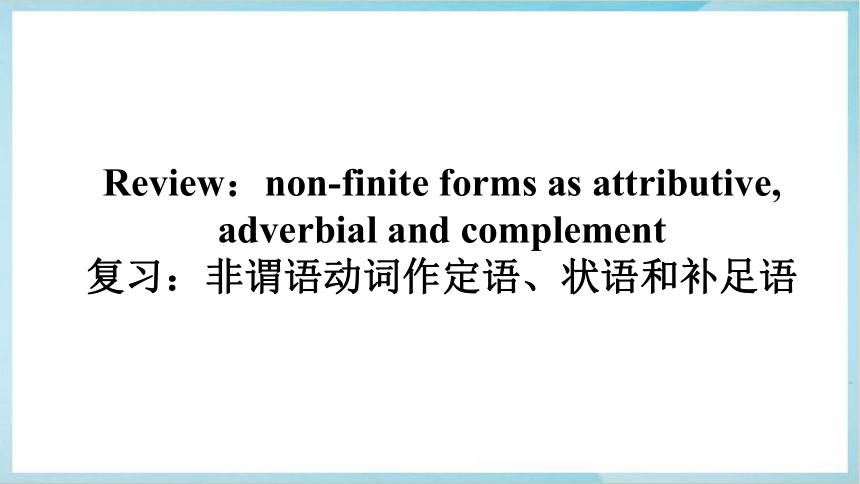
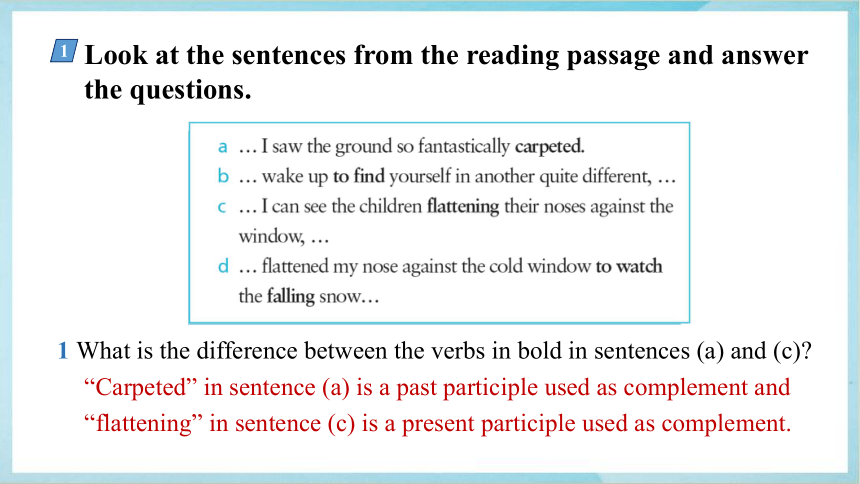
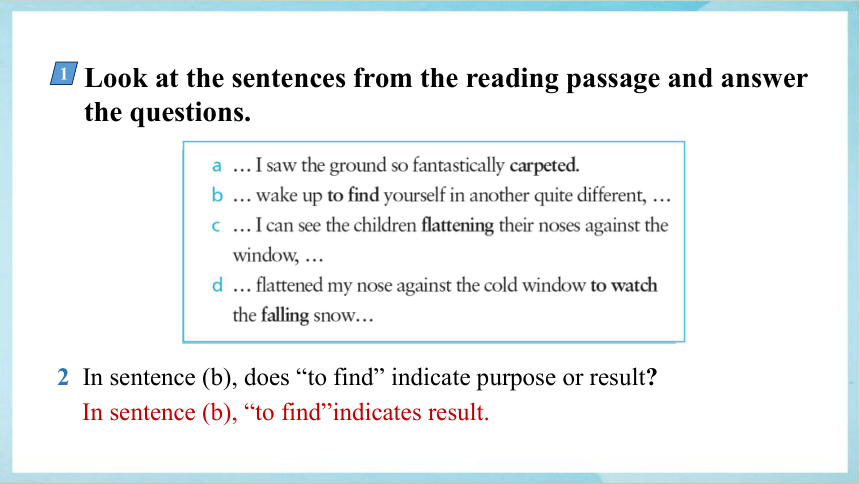
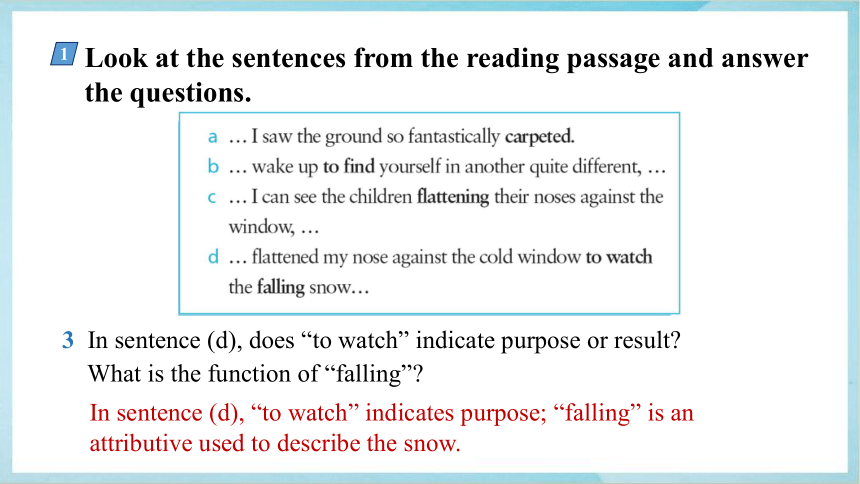

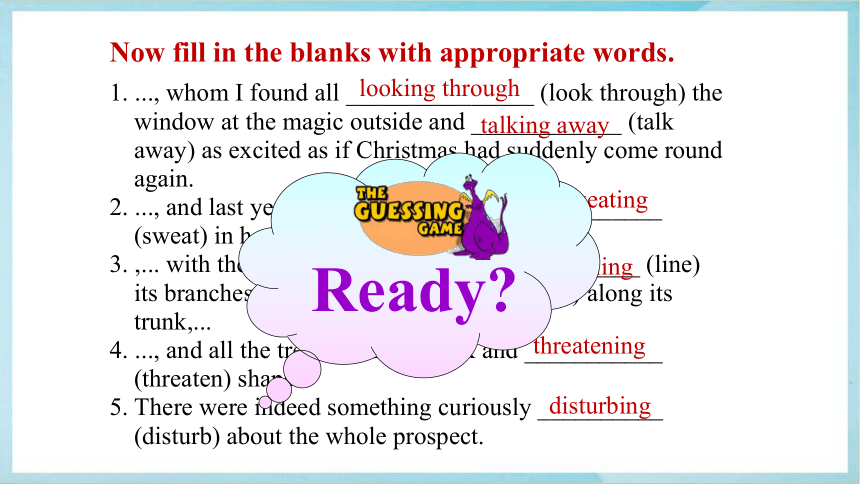
文档简介
(共47张PPT)
Unit 6 Nature in words
Using language
To learn non-finites as attributive, adverbial and complement by analyzing examples and summarizing the rules.
To grasp the usage of non-finites as attributive, adverbial and complement by doing individual work and group work.
To learn to use non-finites as attributive, adverbial and complement to describe your attitude towards nature.
Learning objectives
*bloom v. 开花 66
*charm n. 魅力,魔力 66
*bleak adj. 阴冷的;阴郁的 66
*fade v. 逐渐消失;褪色 66
*orchard n. 果园 66
*cluster n. 串,丛,簇 66
wheat n. 小麦 66
*pile v. 堆放,摞起 66
gentle adj. 轻柔的;温和的 66
sweep v. 吹过,掠过 66
*tinge v. 着淡色于…… 66
*wagon n. 四轮运货车 66
*reap v. 收割(庄稼) 66
Words and expressions
重点词汇
1. ______________ n. 魅力,魔力 → charming adj. 迷人的
2. _______________ adj. 轻柔的;温和的 → gently adv. 轻柔地;温和地
3. fade v. _______________
4. orchard n. _______________
5. cluster n. _______________
6. pile v. _______________
7. _______________ n. 鹅
8. _______________ v. 改进; 增强
9. _______________ v. 开花
10. _______________ adj. 阴冷的; 阴郁的
charm
gentle
逐渐消失;褪色
果园
串,丛,簇
堆放,摞起
goose
enhance
bloom
bleak
重点短语
1. ______________________ 仅仅
2. ______________________ 把……加到……里
3. ______________________ 形状像……
4. ______________________ 与……无关
5. ______________________ 用……代替/替换……
6. ______________________ (攻击的)目标,对象
nothing but
add...to...
be shaped like
be irrelevant to
replace...with...
target for
重点短语
7. ______________________ 比较
8. ______________________ 和……一样
9. ______________________ 和……一样平常
10. ______________________ 例如
11. ______________________ 主要的原因
contrast with
the same as
as normal as
for instance
the main reason
Review:non-finite forms as attributive, adverbial and complement
复习:非谓语动词作定语、状语和补足语
1 What is the difference between the verbs in bold in sentences (a) and (c)
“Carpeted” in sentence (a) is a past participle used as complement and “flattening” in sentence (c) is a present participle used as complement.
1
Look at the sentences from the reading passage and answer the questions.
2 In sentence (b), does “to find” indicate purpose or result
In sentence (b), “to find”indicates result.
1
Look at the sentences from the reading passage and answer the questions.
3 In sentence (d), does “to watch” indicate purpose or result
What is the function of “falling”
In sentence (d), “to watch” indicates purpose; “falling” is an attributive used to describe the snow.
1
Look at the sentences from the reading passage and answer the questions.
1. ..., whom I found all looking through the window at the magic outside and talking away as excited as if Christmas had suddenly come round again.
2. ..., and last year I was out of the country, sweating in hot climate,...
3. ,... with the faintly flushed snow lining its branches and artfully disposed along its trunk,...
4. ..., and all the trees so many black and threatening shapes.
5. There were indeed something curiously disturbing about the whole prospect.
Read the following sentences.
1. ..., whom I found all _______________ (look through) the window at the magic outside and ____________ (talk away) as excited as if Christmas had suddenly come round again.
2. ..., and last year I was out of the country, _________ (sweat) in hot climate,...
3. ,... with the faintly ________ (flush) snow ______ (line) its branches and artfully ________ (dispose) along its trunk,...
4. ..., and all the trees so many black and ___________ (threaten) shapes.
5. There were indeed something curiously __________ (disturb) about the whole prospect.
Now fill in the blanks with appropriate words.
looking through
talking away
sweating
flushed
lining
disposed
threatening
go
Ready
disturbing
①...I saw the ground so fantastically carpeted.
②...wake up to find yourself in another quite different, ...
③...I can see the children flattening their noses against the window, ...
④...flattened my nose against the cold window to watch the falling snow...
① carpeted 过去分词作宾语补足语
② to find 动词不定式短语作结果状语
③ flattening 现在分词作宾语补足语
④ to watch 表示目的;falling 是定语
Summary
Review: non-finite forms
as attributive, adverbial and complement
非谓语动词共有三类:不定式,V-ing, V-ed。
本单元主要复习非谓语动词作定语、状语和补语的用法。
复习:非谓语动词作定语、状语和补语
1. -ing 形式作状语、定语、补语
作状语 -ing形式 用法 例句
doing 表示主动的动作, 可以表示原因、条件、伴随等。作结果状语时, 表示顺理成章的结果。 Finding her car stolen, she hurried to turn to a policeman for help. 发现她的车被偷了, 她匆忙向警察求助。
He ran to fast, falling down to the ground.
他跑得太快了, 结果摔倒在地上。
having done 表示主动, 该动作发生在句子/主句谓语动词所表示的动作之前。 Not having received any reply, he decided to write again.
没有收到任何回复, 他决定再写一封信。
having been done 表示被动、完成的动作。 Having been separated from other continents for millions of years, Australia has many plants not found in any other country in the world. 与其他大陆分离达数百万年, 澳大利亚有许多未在世界上任何其他国家发现的植物。
-ing形式 用法 例句
作定语 doing 表示主动或进行, 如果是-ing短语, 要置于所修饰的名词之后。 Reading is an experience quite different from watching TV; there are pictures forming in your mind instead of before your eyes.
阅读是与看电视非常不同的体验;;图像在大脑中
形成而不是在眼前。
being done 作后置定语, 表示被动且正在进行的动作。 The question being discussed at the meeting now is very important.
现在会议上正在被讨论的问题很重要。
-ing形式 用法 例句
作补语 doing 表示主动或正在进行的动作。如果是被动语态, 那么, 宾语补足语就变成主语补足语。 I can see some kids playing in the playground. 我可以看到一些孩子在操场上玩耍。
(宾语补足语)
The boy who was caught cheating in the exam will be punished.
考试作弊被抓的男生将受到惩罚。
(主语补足语)
注意:英语中有些动词既可以用-ing形式作宾语补足语也可以用不带to的不定式作宾语补足语, 但表达的意义有所不同。
see sb. do sth. (看到某人做了某事, 表示看到事情的全过程)
see sb. doing sth. (看到某人正在做某事, 表示看到的是正在发生的事情)
常见的用不带to的不定式作宾语补足语的动词有:feel, hear, notice, see, watch, observe。
作状语 用法 例句
过去分词作状语, 表示被动的动作, 相当于状语从句, 可以表示时间、原因、条件等, 可以转换为相应的状语从句。 Seen from the hill, the city looks more beautiful.
→ If it is seen from the hill, the city looks more beautiful.
(如果)从山上看, 城市显得更加美丽。
状语从句改成过去分词作状语时有时还可保留连词, 构成“连词+过去分词”结构作状语。 When given a medical examination, you should keep calm.
当你做体检时要保持镇定。
I won’t go to the party unless invited.
我不会去参加聚会的, 除非受到邀请。
2. 过去分词作状语、定语、补语
用法 例句
作定语 过去分词作定语表示被动或完成, 相当于省略了“which/that+be”的定语从句。过去分词用作定语, 如果是单个词, 常置于其所修饰的名词 之前。 We must adapt our thinking to the changed conditions.
我们必须使我们的思想适应改变了的情况。
Trucks and buses were driven on gas carried in large bags on the roof.
卡车与公共汽车皆烧煤气, 煤气装在车顶上的大
袋中。
用法 例句
作补语 作表示感觉或心理状态的动词的宾补。如: see, watch, observe, look at, hear, listen to, feel, notice, find等。 I heard the song sung in English.
我听到有人用英语唱过这首歌。
He found his hometown greatly changed.
他发现他的家乡变化很大。
表示“使; 让”的动词后常接过去分词作宾补。如: have, get, keep, leave等。 I’ll have my hair cut tomorrow.
明天我要理发。
Don’t leave those things undone.
要把那些事情做完。
make oneself后接过去分词作宾补, 表示“使自己被……”。 He spoke in a louder voice in order to make himself heard. 他更大声地讲话, 以便让别人听到。
3. 不定式作状语、定语、补语
作状语 用法 例句
不定式作状语可以表示目的、结果、原因等。不定式作目的状语, 常常置于句首, 如果置于句尾, 不定式前面常常没有逗号。 I stayed there to see what would happen.
我留在那里看看会发生什么事。(目的状语)
I returned home that day to find that everything was being in good order.
那天我回到家却发现一切都那么井井有条。
(结果状语,表示出乎意料的结果。)
I am sorry to hear that.
听到那件事我很难过。(原因状语)
用法 例句
作定语 往往表示要做的事情。 He has nothing to do.
他无事可做。
We reached an agreement to do the work together.
我们达成协议共同做这项工作。
They made a plan to develop new products.
他们制订了一个研制新产品的计划。
用法 例句
作补语 常见的用带to的不定式作宾语补足语的及物动词有: allow, ask, beg, cause, forbid, force, get, invite, persuade, request, teach, tell, remind, want, warn, wish, advise, encourage 等。 We don’t allow them to take away any books from our library.
我们不允许他们带走我们图书馆的任何书。
Finally we persuaded them to stay with us.
最后我们说服他们和我们一起留下来。
常见的用不带to的不定式作宾语补足语的动词有: fell, hear, have, let, make, notice, see, watch, listen to等。 注意: 在主动语态中, 用不带to的不定式作宾语补足语, 在被动语态中, 动词不定式符号to要还原, 动词不定式转而作主语补足语。 I heard someone open the door.
我听见有人开门。(作宾语补足语)
Someone was heard to open the door.
听见有人开门。(作主语补足语)
1. It is an honour for me to be invited __________(attend) the conference.
to attend
2. His mother wanted him ______(be) a teacher when he grew up.
to be
3. She is said to _______________(give) an offer to go to the big company.
have been given
语法达标
5. My teacher encouraged me to study hard ______________(admit) to a key university.
4. He wanted to swim across the river but I warned him not ______(do) so.
to do
to be admitted
10. The computer centre, ________(open) last year, is very popular among the students in this school.
9. ________________ (tell) many times, he still couldn’t understand it.
8. _________(found) in 1636, Harvard is one of the most famous universities in the United States.
6. __________(improve)his English, he gets up early to listen to the radio everyday.
To improve
7. Greatly ________(touch) by his teacher’s words, he did a lot of things to help his classmates.
touched
Founded
Having been told
opened
语法达标
语法达标
1.I saw the ground so fantastically (carpet).
2.I flattened my nose against the cold window to watch the (fall) snow.
3.I can see the children (flatten) their noses against the window.
4.He said that many words (describe) nature were being added to the new version of the junior dictionary.
5.The wheat, (pile) in gentle sheaves , waves in every gentle wind that sweeps above it.
6.Yet the growth of business and industry also widened the gulf between the rich and the poor, (give) rise to reform movements.
7.I heard him (sing) in the next door.
8.American millionaires’ rooms were filled with art (import) from Europe.
carpeted
falling
flattening
describing
piled
giving
singing
imported
翻译句子
1.在这里工作了三十年,Haydon搬去了伦敦。(having worked)
Having worked here for thirty years , Haydon moved to London.
2.谢谢你帮助我的英语。(thank...for...)
Thank you for helping me with my English.
3.画画对我来说很困难。(paint)
Painting is difficult for me.
4.我一直盼望与你相见。(look forward to)
I’m looking forward to meeting you.
5.多说无用。(it is no use)
It’s no use talking too much.
语法达标
I enjoyed 1. (visit) modern art exhibitions . I was looking forward to 2. (visit) the Tate Modern Art Gallery in London . I decided 3. (go) there last Saturday . My friend agreed 4.__________(come) with me . We planned 5. (spend) the whole day there. We planned 6.__________(meet) at 9 am . My friend promised 7.__________(be) there on time . However , my friend hates
8. (get up)early and he arrived an hour late . After half an hour I got tired of 9. (wait) and I 10. (visit) the exhibition alone.
visiting
visiting
to go
to come
to spend
to meet
to be
getting up
waiting
visited
语法达标
The Lake Poets were a small group of poets (______(live) in the Lake District of England in the late 18th and early 19th centuries)现在分词短语作后置定语. The Lake District, __________(know) for its beauty, is in the north-west of England. The first of the poets (________________(come) there)不定式或现在分词短语作后置定语 was Robert Southey, one of the most __________(respect) poets of his time. He was followed by William Wordsworth, perhaps Britain’s most ____________(celebrate) 19th century poet, and then Samuel Coleridge, (who had written the ___________ (pioneer) work Lyrical Ballads with Wordsworth)定语从句. Soon, ________(draw) both by its natural beauty and a desire to(做某事的愿望) be near these famous poets, other poets came ________ (live) in the Lake District. All of these poets were seen as(被看作) part of the Romantic Movement.
湖畔诗人是18世纪末19世纪初生活在英格兰湖区的一小群诗人。湖区位于英格兰西北部,以其美丽而闻名。第一个到那里的诗人是罗伯特·索西,他是那个时代最受尊敬的诗人之一。紧随其后的是威廉·华兹华斯,他可能是英国19世纪最著名的诗人,然后是塞缪尔·柯尔律治,他与华兹华斯一起创作了开创性的作品《抒情歌谣集》。很快,其他诗人被湖区的自然美景和想要接近这些著名诗人的愿望所吸引,也来到了湖区居住。所有这些诗人都被视为浪漫主义运动的一部分。
pioneering
drawn
to live
living
known
to come/coming
respected
celebrated
Complete the passage with the correct form of the verbs in brackets.
2
Today, whilst walking along a peaceful
river running through a university
campus, I was amazed to find…
find blow go see
fall relax enjoy run
3
Look at the pictures and complete the travel journal entry with the words in the box. Use the structures you have learnt in this unit where appropriate.
4
Work in pairs. Talk about a travel experience of your own that brought you closer to nature, using the structures you have learnt in this unit where appropriate.
Last summer, I went hiking alone in the mountains. The fresh air and green trees surrounded me, making me feel close to nature. I saw birds singing in the trees and rivers flowing quietly. At night, I watched the stars shining brightly in the sky. This trip let me appreciate the beauty of nature and feel its power. I felt peaceful and relaxed, far away from the noise of the city. It was a memorable experience that made me cherish every moment with nature.
Sample
Describing nature
There is no month in the whole year (in which nature wears (呈现;显出) a more beautiful appearance than in the month of August)定语从句. Spring has many beauties, and May is a fresh and blooming(v. 开花) month, but the charms(魅力,魔力) of this time of year are enhanced by their contrast with(与...形成对比) the winter season. August has no such advantage. It comes [when we remember nothing but(只有,只不过) clear skies, green fields, and sweet-smelling flowers -when the memory of snow, and ice, and bleak(阴冷的;阴郁的) winds, has faded(逐渐消失;褪色) from our minds]时间状语从句 as completely [as they have disappeared from the earth]比较状语从句 - and yet [what a pleasant time it is]感叹句!
在一整年中,没有哪个月份的大自然比八月更美丽了。春天有许多美丽的事物,五月是一个空气清新、繁花盛开的月份,但与冬季相比,一年中该时节的魅力就更大了,八月就没有这样的优势。当我们只记得晴朗的天空、碧绿的田野和芳香四溢的花朵时,当白雪、寒冰以及寒风的记忆从我们的脑海中完全消失,就像它们从地球上消失一样时,它就来了。然而,这是多么令人愉快的时节啊!
5
Read the paragraph and answer the questions. Pay attention to the words in bold.
Orchards(果园) and fields sing with the sound of work; trees bend beneath the thick clusters(n. 串,丛,簇) of rich fruit which bow their branches to the ground; and the wheat(小麦), (piled(v. 堆放,摞起) in graceful(优雅的,优美的) sheaves(捆,束,扎))过去分词短语作后置定语, or (waving in every gentle(轻柔的,温和的) wind that sweeps(吹过,掠过) above it)现在分词短语作后置定语, tinges(v. 着淡色于...) the landscape with a golden colour. A soft, pleasant light appears to hang over(悬浮在...之上) the whole earth; the influence of the season seems to extend itself even to a passing wagon(四轮运货车), (whose slow motion across the well-reaped(收割) field is seen by the eye, but makes no loud noises upon the ear.)定语从句
(Adaptation from The Pickwick Papers by Charles Dickens)
果园和田野伴着劳动的声音歌唱;浓密的果实压弯了树枝;枝干向地面弯曲;麦子堆成优美的谷堆,或在阵阵拂过的微风中摇曳,给大地染上了金色。一道柔和的、令人愉快的光似乎笼罩着整个大地;八月的影响似乎延伸到了一辆驶过的马车上,它在丰收的田野上缓缓移动,眼睛可以看到,但耳朵却听不到响亮的声音。
(改编自查尔斯·狄更斯的《匹克威克外传》)
5
Read the paragraph and answer the questions. Pay attention to the words in bold.
1 What does this paragraph mainly describe
2 What aspects does the author describe
This paragraph mainly describes the beautiful appearance in the month of August.
The author describes the skies, fields, flowers, orchards, trees, wheat and the quality of the light.
5
Read the paragraph and answer the questions. Pay attention to the words in bold.
Sound 声音
loud
Colour 颜色
clear, green, rich, golden
Action 行动
blooming, bend, bow, piled, waving, sweeps, tinges, makes
Shape 形状
thick clusters, graceful sheaves
Smell 气味
fresh, sweet-smelling
Sensation 感觉
fresh, bleak, gentle, soft, pleasant
Put the words in Activity 5 into the boxes. Find out what they are used to describe.
6
Now think of more words in each category and add them to the boxes. Then describe nature during your favourite season with the words you have learnt.
Spring
Thomas Nash
Spring, the sweet Spring, is the year's pleasant king;
Then blooms each thing, then maids dance in a ring,
Cold doth not sting, the pretty birds do sing,
Cuckoo, jug-jug, pu-we, to-witta-woo!
The palm and may make country houses gay,
Lambs frisk and play, the shepherds pipe all day,
And we hear aye birds tune this merry lay,
Cuckoo, jug-jug, pu-we, to-witta-woo!
The fields breathe sweet, the daisies kiss our feet,
Young lovers meet, old wives a-sunning sit,
In every street theses tunes our ears do greet,
Cuckoo, jug-jug, pu-we, to-witta-woo!
春,甘美之春,一年之中的尧舜,处处都有花树,都有女儿环舞,
微寒但觉清和,佳禽争着唱歌,
啁啁,啾啾,哥哥,割麦、插一禾!
榆柳呀山楂,打扮着田舍人家,
羊羔嬉游,牧笛儿整日价吹奏,
百鸟总在和鸣,一片悠扬声韵,
啁啁,啾啾,哥哥,割麦、插一禾!
郊原荡漾香风,雏菊吻人脚踵,
情侣作对成双,老妪坐晒阳光,
走向任何通衢,都有歌声悦耳,
啁啁,啾啾,哥哥,割麦、插一禾!
Did you know
【Open a dictionary, and you'll be surprised to find(惊讶地发现) (that there are many more words about nature than you would think)宾语从句.】祈使句+and+陈述句 There are various ways (to describe the things (we see in the natural world)定语从句)不定式短语作后置定语, [no matter whether it's a flower, a weed, an animal or(无论...还是...) the rain]让步状语从句. For example, there are many ways to describe the different sounds of birds, such as chatter, chirp, cluck, hoot and tweet. These words can help us to write vivid descriptions of (生动地描绘) nature.
打开词典,你会惊讶地发现关于自然的单词比你认为的要多得多。有各种各样的方式来描述我们在自然界中看到的事物,不管它是一朵花、一只动物还是一场雨。例如,有很多方法来描述鸟儿不同的声音,如chatter(唧唧叫), chirp(叽叽喳喳), cluck(咯咯叫), hoot(呜呜) 和tweet(啾啾)。这些单词可以帮助我们生动地描绘自然。
1 What book was the man reading
The man was reading a book called Landmarks.
2 Why was the man annoyed
7
Listen to the conversation and answer the questions.
Because he read a book, whose author said many words describing nature were now missing from the new version of the junior dictionary.
She says we are losing old words all the time. And as times change, new words become as normal to young people as the old ones are to her grandfather.
3 What was the girl’s opinion
Listen to the conversation again and correct the mistakes in the man’s blog.
“annoyed” instead of “confused”
“a different opinion from” instead of “the same opinion as”
“now missing from” instead of “being added to”
“field of grass” instead of “dense forest”
“blue flowers” instead of “fruit”
“blog” instead of “film”
“on computers” instead of “watching TV”
“history” instead of “literature”
“new words become as normal to young people as the old ones are to me” instead of “old words become as normal to young people as the new ones are to me”
Recently I was reading a book called Landmarks by Robert Macfarlane. What the author wrote made me feel confused. He said that many words describing nature were being added to the new version of the junior dictionary. These are words like “ pasture” and “bluebell”. A “pasture” is a dense forest for cows and horses to eat. “Bluebells” are fruit shaped like bells. The reason why they are doing this is that they think these words are irrelevant to children, so instead they`ve replaced them with terms like “film”. Perhaps the dictionary does have a point, because most children don`t get out into nature that much nowadays. They spend all their time watching TV instead. But it`s a pity. In my opinion, these words from part of our literature. They add colour to our lives, and shouldn’t be lost. My granddaughter has the same opinion as me. She says we are losing old words all the time. And as times change, old words become as normal to young people as the new ones are to me.
8
Now work in pairs and act out the conversation.
Eric’s blog
Recently I was reading a book called Landmarks by Robert Macfarlane. (What the author wrote)主语从句 made me feel confused(感到困惑). He said (that many words (describing nature)现在分词短语作后置定语 were being added to(被添加到……) the new version(版本) of the junior (初级的) dictionary)宾语从句. These are words like "pasture" and "bluebell". A "pasture" is a dense(浓厚的;密集的) forest for cows and horses to eat. "Bluebells" are fruit (shaped like bells)过去分词短语作后置定语. The reason (why they are doing this)定语从句 is (that they think these words are irrelevant to(不切题;与……不相干) children)表语从句, so instead they've replaced them with terms like "film".
最近我在读一本罗伯特·麦克法兰写的叫作《地标》的书。作者写的东西让我感到困惑。他说许多描述自然的单词正被添加到新版本的初级词典中,比如“pasture”和“bluebell”。“pasture”是供牛和马吃的茂密森林。“bluebell”是形状像铃铛的水果。他们这样做的原因是,他们认为这些单词与儿童无关,所以他们用“film”之类的词来代替它们。
The reason why... is that...
……的原因是……
Perhaps the dictionary does have a point(有道理), because most children don't get out into nature(外出接触大自然) that (adv. =so 那么;很,非常) much nowadays. They spend all their time watching TV instead. But it's a pity. In my opinion(在某人看来), these words form part of our literature. They add colour to our lives, and shouldn't be lost. My granddaughter has the same opinion as (和某人有相同的观点) me. She says we are losing old words all the time(一直). And [as times change]时间状语从句, old words become as normal to young people as the new ones are to me.
也许这本词典确实有道理,因为现在大多数孩子很少外出接触大自然,相反,他们把所有的时间都花在看电视上。但是很遗憾。在我看来,这些单词构成了我们文学的一部分,它们为我们的生活增添了色彩,不应该丢失。我的孙女和我有同样的看法,她说我们一直在丢失旧词。随着时代的变化,年轻人看旧词就像我看新词一样平常了。
become as normal to ... as ...
对……来说变得和……一样平常
M = male speaker, Eric, grandfather;
F = female speaker, Suzie, his granddaughter
F: Morning, Grandpa!
M: [grumpily] Morning, Suzie.
F: Grandpa, is there something wrong You seem a bit upset.
M: Yes, well... I'm sorry, Suzie. It's just that I've been reading this new book called Landmarks by Robert
Macfarlane, and something he wrote about has made me rather annoyed.
F: What is it
M: He explained that many words describing nature were now missing from the new version of the junior
dictionary.
F: I don't quite understand. Can you give me some examples
M: Well, words such as “pasture” and “bluebell”.
F: I don't know those words. What do they mean
M: The former means a field of grass for cows and horses to eat. “Bluebells” are blue flowers shaped like bells.
F: I've never heard of them. Why would they take them out of the dictionary
M: Well, according to Macfarlane, the main reason for doing this is that these words are no longer relevant to children. Instead, they've replaced them with new terms like “blog”.
听力文本
F: I don't know, maybe the dictionary has a point. Most children don't get out into nature that much
nowadays. They spend much of their time on computers, for instance. I think the new terms they added
are words we hear in our everyday use.
M: Ah! That may be true, but it's a pity.
F: In what way
M: Two reasons, I think. Firstly, children are losing the joy of being young, of being outside under the trees
with grass under their feet. Secondly, these words form part of our history. They add colour to our lives,
and shouldn't be lost.
F: I'm not so sure, Grandpa. Young people might not get out into nature much, but we still experience joy.
And as for losing words... well, you don't remember all the words from Shakespeare's day, do you
M: Er... well, no...
F: Exactly! Times puters play a large part in our lives now. Consider social media. It is as
normal to us now as... what was that funny old word you said Posture
M: Pasture, Suzie!
F: Yes. Social media is as normal to young people as pasture is to you.
M: [sighs]
F: [laughs] I know what would cheer you up. Let's go for a walk outside.
M: Aha! See You can't beat nature, Suzie, eh [both laugh]
听力文本
… such as…
The main reason…
…, for instance.
Two reasons, I think.
Consider…
Giving examples
Giving explanations
… such as…
…, for instance.
Two reasons, I think.
The main reason…
Consider…
9
Complete the boxes with the expressions from
the conversation.
10
Work in pairs. Talk about your opinions of the issue discussed in Activity 8 using the expressions in this section.
Now think about your performance.
Have you actively participated in the discussion
What can you do to improve your performance
Describe nature during your favorite season with the words you have learnt.
Homework
Unit 6 Nature in words
Using language
To learn non-finites as attributive, adverbial and complement by analyzing examples and summarizing the rules.
To grasp the usage of non-finites as attributive, adverbial and complement by doing individual work and group work.
To learn to use non-finites as attributive, adverbial and complement to describe your attitude towards nature.
Learning objectives
*bloom v. 开花 66
*charm n. 魅力,魔力 66
*bleak adj. 阴冷的;阴郁的 66
*fade v. 逐渐消失;褪色 66
*orchard n. 果园 66
*cluster n. 串,丛,簇 66
wheat n. 小麦 66
*pile v. 堆放,摞起 66
gentle adj. 轻柔的;温和的 66
sweep v. 吹过,掠过 66
*tinge v. 着淡色于…… 66
*wagon n. 四轮运货车 66
*reap v. 收割(庄稼) 66
Words and expressions
重点词汇
1. ______________ n. 魅力,魔力 → charming adj. 迷人的
2. _______________ adj. 轻柔的;温和的 → gently adv. 轻柔地;温和地
3. fade v. _______________
4. orchard n. _______________
5. cluster n. _______________
6. pile v. _______________
7. _______________ n. 鹅
8. _______________ v. 改进; 增强
9. _______________ v. 开花
10. _______________ adj. 阴冷的; 阴郁的
charm
gentle
逐渐消失;褪色
果园
串,丛,簇
堆放,摞起
goose
enhance
bloom
bleak
重点短语
1. ______________________ 仅仅
2. ______________________ 把……加到……里
3. ______________________ 形状像……
4. ______________________ 与……无关
5. ______________________ 用……代替/替换……
6. ______________________ (攻击的)目标,对象
nothing but
add...to...
be shaped like
be irrelevant to
replace...with...
target for
重点短语
7. ______________________ 比较
8. ______________________ 和……一样
9. ______________________ 和……一样平常
10. ______________________ 例如
11. ______________________ 主要的原因
contrast with
the same as
as normal as
for instance
the main reason
Review:non-finite forms as attributive, adverbial and complement
复习:非谓语动词作定语、状语和补足语
1 What is the difference between the verbs in bold in sentences (a) and (c)
“Carpeted” in sentence (a) is a past participle used as complement and “flattening” in sentence (c) is a present participle used as complement.
1
Look at the sentences from the reading passage and answer the questions.
2 In sentence (b), does “to find” indicate purpose or result
In sentence (b), “to find”indicates result.
1
Look at the sentences from the reading passage and answer the questions.
3 In sentence (d), does “to watch” indicate purpose or result
What is the function of “falling”
In sentence (d), “to watch” indicates purpose; “falling” is an attributive used to describe the snow.
1
Look at the sentences from the reading passage and answer the questions.
1. ..., whom I found all looking through the window at the magic outside and talking away as excited as if Christmas had suddenly come round again.
2. ..., and last year I was out of the country, sweating in hot climate,...
3. ,... with the faintly flushed snow lining its branches and artfully disposed along its trunk,...
4. ..., and all the trees so many black and threatening shapes.
5. There were indeed something curiously disturbing about the whole prospect.
Read the following sentences.
1. ..., whom I found all _______________ (look through) the window at the magic outside and ____________ (talk away) as excited as if Christmas had suddenly come round again.
2. ..., and last year I was out of the country, _________ (sweat) in hot climate,...
3. ,... with the faintly ________ (flush) snow ______ (line) its branches and artfully ________ (dispose) along its trunk,...
4. ..., and all the trees so many black and ___________ (threaten) shapes.
5. There were indeed something curiously __________ (disturb) about the whole prospect.
Now fill in the blanks with appropriate words.
looking through
talking away
sweating
flushed
lining
disposed
threatening
go
Ready
disturbing
①...I saw the ground so fantastically carpeted.
②...wake up to find yourself in another quite different, ...
③...I can see the children flattening their noses against the window, ...
④...flattened my nose against the cold window to watch the falling snow...
① carpeted 过去分词作宾语补足语
② to find 动词不定式短语作结果状语
③ flattening 现在分词作宾语补足语
④ to watch 表示目的;falling 是定语
Summary
Review: non-finite forms
as attributive, adverbial and complement
非谓语动词共有三类:不定式,V-ing, V-ed。
本单元主要复习非谓语动词作定语、状语和补语的用法。
复习:非谓语动词作定语、状语和补语
1. -ing 形式作状语、定语、补语
作状语 -ing形式 用法 例句
doing 表示主动的动作, 可以表示原因、条件、伴随等。作结果状语时, 表示顺理成章的结果。 Finding her car stolen, she hurried to turn to a policeman for help. 发现她的车被偷了, 她匆忙向警察求助。
He ran to fast, falling down to the ground.
他跑得太快了, 结果摔倒在地上。
having done 表示主动, 该动作发生在句子/主句谓语动词所表示的动作之前。 Not having received any reply, he decided to write again.
没有收到任何回复, 他决定再写一封信。
having been done 表示被动、完成的动作。 Having been separated from other continents for millions of years, Australia has many plants not found in any other country in the world. 与其他大陆分离达数百万年, 澳大利亚有许多未在世界上任何其他国家发现的植物。
-ing形式 用法 例句
作定语 doing 表示主动或进行, 如果是-ing短语, 要置于所修饰的名词之后。 Reading is an experience quite different from watching TV; there are pictures forming in your mind instead of before your eyes.
阅读是与看电视非常不同的体验;;图像在大脑中
形成而不是在眼前。
being done 作后置定语, 表示被动且正在进行的动作。 The question being discussed at the meeting now is very important.
现在会议上正在被讨论的问题很重要。
-ing形式 用法 例句
作补语 doing 表示主动或正在进行的动作。如果是被动语态, 那么, 宾语补足语就变成主语补足语。 I can see some kids playing in the playground. 我可以看到一些孩子在操场上玩耍。
(宾语补足语)
The boy who was caught cheating in the exam will be punished.
考试作弊被抓的男生将受到惩罚。
(主语补足语)
注意:英语中有些动词既可以用-ing形式作宾语补足语也可以用不带to的不定式作宾语补足语, 但表达的意义有所不同。
see sb. do sth. (看到某人做了某事, 表示看到事情的全过程)
see sb. doing sth. (看到某人正在做某事, 表示看到的是正在发生的事情)
常见的用不带to的不定式作宾语补足语的动词有:feel, hear, notice, see, watch, observe。
作状语 用法 例句
过去分词作状语, 表示被动的动作, 相当于状语从句, 可以表示时间、原因、条件等, 可以转换为相应的状语从句。 Seen from the hill, the city looks more beautiful.
→ If it is seen from the hill, the city looks more beautiful.
(如果)从山上看, 城市显得更加美丽。
状语从句改成过去分词作状语时有时还可保留连词, 构成“连词+过去分词”结构作状语。 When given a medical examination, you should keep calm.
当你做体检时要保持镇定。
I won’t go to the party unless invited.
我不会去参加聚会的, 除非受到邀请。
2. 过去分词作状语、定语、补语
用法 例句
作定语 过去分词作定语表示被动或完成, 相当于省略了“which/that+be”的定语从句。过去分词用作定语, 如果是单个词, 常置于其所修饰的名词 之前。 We must adapt our thinking to the changed conditions.
我们必须使我们的思想适应改变了的情况。
Trucks and buses were driven on gas carried in large bags on the roof.
卡车与公共汽车皆烧煤气, 煤气装在车顶上的大
袋中。
用法 例句
作补语 作表示感觉或心理状态的动词的宾补。如: see, watch, observe, look at, hear, listen to, feel, notice, find等。 I heard the song sung in English.
我听到有人用英语唱过这首歌。
He found his hometown greatly changed.
他发现他的家乡变化很大。
表示“使; 让”的动词后常接过去分词作宾补。如: have, get, keep, leave等。 I’ll have my hair cut tomorrow.
明天我要理发。
Don’t leave those things undone.
要把那些事情做完。
make oneself后接过去分词作宾补, 表示“使自己被……”。 He spoke in a louder voice in order to make himself heard. 他更大声地讲话, 以便让别人听到。
3. 不定式作状语、定语、补语
作状语 用法 例句
不定式作状语可以表示目的、结果、原因等。不定式作目的状语, 常常置于句首, 如果置于句尾, 不定式前面常常没有逗号。 I stayed there to see what would happen.
我留在那里看看会发生什么事。(目的状语)
I returned home that day to find that everything was being in good order.
那天我回到家却发现一切都那么井井有条。
(结果状语,表示出乎意料的结果。)
I am sorry to hear that.
听到那件事我很难过。(原因状语)
用法 例句
作定语 往往表示要做的事情。 He has nothing to do.
他无事可做。
We reached an agreement to do the work together.
我们达成协议共同做这项工作。
They made a plan to develop new products.
他们制订了一个研制新产品的计划。
用法 例句
作补语 常见的用带to的不定式作宾语补足语的及物动词有: allow, ask, beg, cause, forbid, force, get, invite, persuade, request, teach, tell, remind, want, warn, wish, advise, encourage 等。 We don’t allow them to take away any books from our library.
我们不允许他们带走我们图书馆的任何书。
Finally we persuaded them to stay with us.
最后我们说服他们和我们一起留下来。
常见的用不带to的不定式作宾语补足语的动词有: fell, hear, have, let, make, notice, see, watch, listen to等。 注意: 在主动语态中, 用不带to的不定式作宾语补足语, 在被动语态中, 动词不定式符号to要还原, 动词不定式转而作主语补足语。 I heard someone open the door.
我听见有人开门。(作宾语补足语)
Someone was heard to open the door.
听见有人开门。(作主语补足语)
1. It is an honour for me to be invited __________(attend) the conference.
to attend
2. His mother wanted him ______(be) a teacher when he grew up.
to be
3. She is said to _______________(give) an offer to go to the big company.
have been given
语法达标
5. My teacher encouraged me to study hard ______________(admit) to a key university.
4. He wanted to swim across the river but I warned him not ______(do) so.
to do
to be admitted
10. The computer centre, ________(open) last year, is very popular among the students in this school.
9. ________________ (tell) many times, he still couldn’t understand it.
8. _________(found) in 1636, Harvard is one of the most famous universities in the United States.
6. __________(improve)his English, he gets up early to listen to the radio everyday.
To improve
7. Greatly ________(touch) by his teacher’s words, he did a lot of things to help his classmates.
touched
Founded
Having been told
opened
语法达标
语法达标
1.I saw the ground so fantastically (carpet).
2.I flattened my nose against the cold window to watch the (fall) snow.
3.I can see the children (flatten) their noses against the window.
4.He said that many words (describe) nature were being added to the new version of the junior dictionary.
5.The wheat, (pile) in gentle sheaves , waves in every gentle wind that sweeps above it.
6.Yet the growth of business and industry also widened the gulf between the rich and the poor, (give) rise to reform movements.
7.I heard him (sing) in the next door.
8.American millionaires’ rooms were filled with art (import) from Europe.
carpeted
falling
flattening
describing
piled
giving
singing
imported
翻译句子
1.在这里工作了三十年,Haydon搬去了伦敦。(having worked)
Having worked here for thirty years , Haydon moved to London.
2.谢谢你帮助我的英语。(thank...for...)
Thank you for helping me with my English.
3.画画对我来说很困难。(paint)
Painting is difficult for me.
4.我一直盼望与你相见。(look forward to)
I’m looking forward to meeting you.
5.多说无用。(it is no use)
It’s no use talking too much.
语法达标
I enjoyed 1. (visit) modern art exhibitions . I was looking forward to 2. (visit) the Tate Modern Art Gallery in London . I decided 3. (go) there last Saturday . My friend agreed 4.__________(come) with me . We planned 5. (spend) the whole day there. We planned 6.__________(meet) at 9 am . My friend promised 7.__________(be) there on time . However , my friend hates
8. (get up)early and he arrived an hour late . After half an hour I got tired of 9. (wait) and I 10. (visit) the exhibition alone.
visiting
visiting
to go
to come
to spend
to meet
to be
getting up
waiting
visited
语法达标
The Lake Poets were a small group of poets (______(live) in the Lake District of England in the late 18th and early 19th centuries)现在分词短语作后置定语. The Lake District, __________(know) for its beauty, is in the north-west of England. The first of the poets (________________(come) there)不定式或现在分词短语作后置定语 was Robert Southey, one of the most __________(respect) poets of his time. He was followed by William Wordsworth, perhaps Britain’s most ____________(celebrate) 19th century poet, and then Samuel Coleridge, (who had written the ___________ (pioneer) work Lyrical Ballads with Wordsworth)定语从句. Soon, ________(draw) both by its natural beauty and a desire to(做某事的愿望) be near these famous poets, other poets came ________ (live) in the Lake District. All of these poets were seen as(被看作) part of the Romantic Movement.
湖畔诗人是18世纪末19世纪初生活在英格兰湖区的一小群诗人。湖区位于英格兰西北部,以其美丽而闻名。第一个到那里的诗人是罗伯特·索西,他是那个时代最受尊敬的诗人之一。紧随其后的是威廉·华兹华斯,他可能是英国19世纪最著名的诗人,然后是塞缪尔·柯尔律治,他与华兹华斯一起创作了开创性的作品《抒情歌谣集》。很快,其他诗人被湖区的自然美景和想要接近这些著名诗人的愿望所吸引,也来到了湖区居住。所有这些诗人都被视为浪漫主义运动的一部分。
pioneering
drawn
to live
living
known
to come/coming
respected
celebrated
Complete the passage with the correct form of the verbs in brackets.
2
Today, whilst walking along a peaceful
river running through a university
campus, I was amazed to find…
find blow go see
fall relax enjoy run
3
Look at the pictures and complete the travel journal entry with the words in the box. Use the structures you have learnt in this unit where appropriate.
4
Work in pairs. Talk about a travel experience of your own that brought you closer to nature, using the structures you have learnt in this unit where appropriate.
Last summer, I went hiking alone in the mountains. The fresh air and green trees surrounded me, making me feel close to nature. I saw birds singing in the trees and rivers flowing quietly. At night, I watched the stars shining brightly in the sky. This trip let me appreciate the beauty of nature and feel its power. I felt peaceful and relaxed, far away from the noise of the city. It was a memorable experience that made me cherish every moment with nature.
Sample
Describing nature
There is no month in the whole year (in which nature wears (呈现;显出) a more beautiful appearance than in the month of August)定语从句. Spring has many beauties, and May is a fresh and blooming(v. 开花) month, but the charms(魅力,魔力) of this time of year are enhanced by their contrast with(与...形成对比) the winter season. August has no such advantage. It comes [when we remember nothing but(只有,只不过) clear skies, green fields, and sweet-smelling flowers -when the memory of snow, and ice, and bleak(阴冷的;阴郁的) winds, has faded(逐渐消失;褪色) from our minds]时间状语从句 as completely [as they have disappeared from the earth]比较状语从句 - and yet [what a pleasant time it is]感叹句!
在一整年中,没有哪个月份的大自然比八月更美丽了。春天有许多美丽的事物,五月是一个空气清新、繁花盛开的月份,但与冬季相比,一年中该时节的魅力就更大了,八月就没有这样的优势。当我们只记得晴朗的天空、碧绿的田野和芳香四溢的花朵时,当白雪、寒冰以及寒风的记忆从我们的脑海中完全消失,就像它们从地球上消失一样时,它就来了。然而,这是多么令人愉快的时节啊!
5
Read the paragraph and answer the questions. Pay attention to the words in bold.
Orchards(果园) and fields sing with the sound of work; trees bend beneath the thick clusters(n. 串,丛,簇) of rich fruit which bow their branches to the ground; and the wheat(小麦), (piled(v. 堆放,摞起) in graceful(优雅的,优美的) sheaves(捆,束,扎))过去分词短语作后置定语, or (waving in every gentle(轻柔的,温和的) wind that sweeps(吹过,掠过) above it)现在分词短语作后置定语, tinges(v. 着淡色于...) the landscape with a golden colour. A soft, pleasant light appears to hang over(悬浮在...之上) the whole earth; the influence of the season seems to extend itself even to a passing wagon(四轮运货车), (whose slow motion across the well-reaped(收割) field is seen by the eye, but makes no loud noises upon the ear.)定语从句
(Adaptation from The Pickwick Papers by Charles Dickens)
果园和田野伴着劳动的声音歌唱;浓密的果实压弯了树枝;枝干向地面弯曲;麦子堆成优美的谷堆,或在阵阵拂过的微风中摇曳,给大地染上了金色。一道柔和的、令人愉快的光似乎笼罩着整个大地;八月的影响似乎延伸到了一辆驶过的马车上,它在丰收的田野上缓缓移动,眼睛可以看到,但耳朵却听不到响亮的声音。
(改编自查尔斯·狄更斯的《匹克威克外传》)
5
Read the paragraph and answer the questions. Pay attention to the words in bold.
1 What does this paragraph mainly describe
2 What aspects does the author describe
This paragraph mainly describes the beautiful appearance in the month of August.
The author describes the skies, fields, flowers, orchards, trees, wheat and the quality of the light.
5
Read the paragraph and answer the questions. Pay attention to the words in bold.
Sound 声音
loud
Colour 颜色
clear, green, rich, golden
Action 行动
blooming, bend, bow, piled, waving, sweeps, tinges, makes
Shape 形状
thick clusters, graceful sheaves
Smell 气味
fresh, sweet-smelling
Sensation 感觉
fresh, bleak, gentle, soft, pleasant
Put the words in Activity 5 into the boxes. Find out what they are used to describe.
6
Now think of more words in each category and add them to the boxes. Then describe nature during your favourite season with the words you have learnt.
Spring
Thomas Nash
Spring, the sweet Spring, is the year's pleasant king;
Then blooms each thing, then maids dance in a ring,
Cold doth not sting, the pretty birds do sing,
Cuckoo, jug-jug, pu-we, to-witta-woo!
The palm and may make country houses gay,
Lambs frisk and play, the shepherds pipe all day,
And we hear aye birds tune this merry lay,
Cuckoo, jug-jug, pu-we, to-witta-woo!
The fields breathe sweet, the daisies kiss our feet,
Young lovers meet, old wives a-sunning sit,
In every street theses tunes our ears do greet,
Cuckoo, jug-jug, pu-we, to-witta-woo!
春,甘美之春,一年之中的尧舜,处处都有花树,都有女儿环舞,
微寒但觉清和,佳禽争着唱歌,
啁啁,啾啾,哥哥,割麦、插一禾!
榆柳呀山楂,打扮着田舍人家,
羊羔嬉游,牧笛儿整日价吹奏,
百鸟总在和鸣,一片悠扬声韵,
啁啁,啾啾,哥哥,割麦、插一禾!
郊原荡漾香风,雏菊吻人脚踵,
情侣作对成双,老妪坐晒阳光,
走向任何通衢,都有歌声悦耳,
啁啁,啾啾,哥哥,割麦、插一禾!
Did you know
【Open a dictionary, and you'll be surprised to find(惊讶地发现) (that there are many more words about nature than you would think)宾语从句.】祈使句+and+陈述句 There are various ways (to describe the things (we see in the natural world)定语从句)不定式短语作后置定语, [no matter whether it's a flower, a weed, an animal or(无论...还是...) the rain]让步状语从句. For example, there are many ways to describe the different sounds of birds, such as chatter, chirp, cluck, hoot and tweet. These words can help us to write vivid descriptions of (生动地描绘) nature.
打开词典,你会惊讶地发现关于自然的单词比你认为的要多得多。有各种各样的方式来描述我们在自然界中看到的事物,不管它是一朵花、一只动物还是一场雨。例如,有很多方法来描述鸟儿不同的声音,如chatter(唧唧叫), chirp(叽叽喳喳), cluck(咯咯叫), hoot(呜呜) 和tweet(啾啾)。这些单词可以帮助我们生动地描绘自然。
1 What book was the man reading
The man was reading a book called Landmarks.
2 Why was the man annoyed
7
Listen to the conversation and answer the questions.
Because he read a book, whose author said many words describing nature were now missing from the new version of the junior dictionary.
She says we are losing old words all the time. And as times change, new words become as normal to young people as the old ones are to her grandfather.
3 What was the girl’s opinion
Listen to the conversation again and correct the mistakes in the man’s blog.
“annoyed” instead of “confused”
“a different opinion from” instead of “the same opinion as”
“now missing from” instead of “being added to”
“field of grass” instead of “dense forest”
“blue flowers” instead of “fruit”
“blog” instead of “film”
“on computers” instead of “watching TV”
“history” instead of “literature”
“new words become as normal to young people as the old ones are to me” instead of “old words become as normal to young people as the new ones are to me”
Recently I was reading a book called Landmarks by Robert Macfarlane. What the author wrote made me feel confused. He said that many words describing nature were being added to the new version of the junior dictionary. These are words like “ pasture” and “bluebell”. A “pasture” is a dense forest for cows and horses to eat. “Bluebells” are fruit shaped like bells. The reason why they are doing this is that they think these words are irrelevant to children, so instead they`ve replaced them with terms like “film”. Perhaps the dictionary does have a point, because most children don`t get out into nature that much nowadays. They spend all their time watching TV instead. But it`s a pity. In my opinion, these words from part of our literature. They add colour to our lives, and shouldn’t be lost. My granddaughter has the same opinion as me. She says we are losing old words all the time. And as times change, old words become as normal to young people as the new ones are to me.
8
Now work in pairs and act out the conversation.
Eric’s blog
Recently I was reading a book called Landmarks by Robert Macfarlane. (What the author wrote)主语从句 made me feel confused(感到困惑). He said (that many words (describing nature)现在分词短语作后置定语 were being added to(被添加到……) the new version(版本) of the junior (初级的) dictionary)宾语从句. These are words like "pasture" and "bluebell". A "pasture" is a dense(浓厚的;密集的) forest for cows and horses to eat. "Bluebells" are fruit (shaped like bells)过去分词短语作后置定语. The reason (why they are doing this)定语从句 is (that they think these words are irrelevant to(不切题;与……不相干) children)表语从句, so instead they've replaced them with terms like "film".
最近我在读一本罗伯特·麦克法兰写的叫作《地标》的书。作者写的东西让我感到困惑。他说许多描述自然的单词正被添加到新版本的初级词典中,比如“pasture”和“bluebell”。“pasture”是供牛和马吃的茂密森林。“bluebell”是形状像铃铛的水果。他们这样做的原因是,他们认为这些单词与儿童无关,所以他们用“film”之类的词来代替它们。
The reason why... is that...
……的原因是……
Perhaps the dictionary does have a point(有道理), because most children don't get out into nature(外出接触大自然) that (adv. =so 那么;很,非常) much nowadays. They spend all their time watching TV instead. But it's a pity. In my opinion(在某人看来), these words form part of our literature. They add colour to our lives, and shouldn't be lost. My granddaughter has the same opinion as (和某人有相同的观点) me. She says we are losing old words all the time(一直). And [as times change]时间状语从句, old words become as normal to young people as the new ones are to me.
也许这本词典确实有道理,因为现在大多数孩子很少外出接触大自然,相反,他们把所有的时间都花在看电视上。但是很遗憾。在我看来,这些单词构成了我们文学的一部分,它们为我们的生活增添了色彩,不应该丢失。我的孙女和我有同样的看法,她说我们一直在丢失旧词。随着时代的变化,年轻人看旧词就像我看新词一样平常了。
become as normal to ... as ...
对……来说变得和……一样平常
M = male speaker, Eric, grandfather;
F = female speaker, Suzie, his granddaughter
F: Morning, Grandpa!
M: [grumpily] Morning, Suzie.
F: Grandpa, is there something wrong You seem a bit upset.
M: Yes, well... I'm sorry, Suzie. It's just that I've been reading this new book called Landmarks by Robert
Macfarlane, and something he wrote about has made me rather annoyed.
F: What is it
M: He explained that many words describing nature were now missing from the new version of the junior
dictionary.
F: I don't quite understand. Can you give me some examples
M: Well, words such as “pasture” and “bluebell”.
F: I don't know those words. What do they mean
M: The former means a field of grass for cows and horses to eat. “Bluebells” are blue flowers shaped like bells.
F: I've never heard of them. Why would they take them out of the dictionary
M: Well, according to Macfarlane, the main reason for doing this is that these words are no longer relevant to children. Instead, they've replaced them with new terms like “blog”.
听力文本
F: I don't know, maybe the dictionary has a point. Most children don't get out into nature that much
nowadays. They spend much of their time on computers, for instance. I think the new terms they added
are words we hear in our everyday use.
M: Ah! That may be true, but it's a pity.
F: In what way
M: Two reasons, I think. Firstly, children are losing the joy of being young, of being outside under the trees
with grass under their feet. Secondly, these words form part of our history. They add colour to our lives,
and shouldn't be lost.
F: I'm not so sure, Grandpa. Young people might not get out into nature much, but we still experience joy.
And as for losing words... well, you don't remember all the words from Shakespeare's day, do you
M: Er... well, no...
F: Exactly! Times puters play a large part in our lives now. Consider social media. It is as
normal to us now as... what was that funny old word you said Posture
M: Pasture, Suzie!
F: Yes. Social media is as normal to young people as pasture is to you.
M: [sighs]
F: [laughs] I know what would cheer you up. Let's go for a walk outside.
M: Aha! See You can't beat nature, Suzie, eh [both laugh]
听力文本
… such as…
The main reason…
…, for instance.
Two reasons, I think.
Consider…
Giving examples
Giving explanations
… such as…
…, for instance.
Two reasons, I think.
The main reason…
Consider…
9
Complete the boxes with the expressions from
the conversation.
10
Work in pairs. Talk about your opinions of the issue discussed in Activity 8 using the expressions in this section.
Now think about your performance.
Have you actively participated in the discussion
What can you do to improve your performance
Describe nature during your favorite season with the words you have learnt.
Homework
